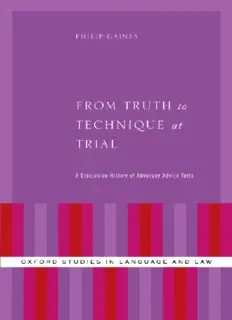Table Of Content
From Truth to Technique at Trial
OXFORD STUDIES IN LANGUAGE AND LAW
Oxford Studies in Language and Law includes scholarly analyses and descriptions
of language evidence in civil and criminal law cases as well as language issues
arising in the area of statutes, statutory interpretation, courtroom discourse,
jury instructions, and historical changes in legal language.
Series Editor:
Roger W. Shuy, Georgetown University
Editorial Board:
Janet Ainsworth, Seattle University School of Law
Janet Cotterill, Cardiff University, UK
Christopher Heffer, Cardiff University, UK
Robert Leonard, Hofstra University
Anne Lise Kjær, University of Copenhagen
Gregory Matoesian, University of Illinois at Chicago
Elizabeth Mertz, University of Wisconsin Law School and American Bar Foundation
Lawrence Solan, Brooklyn Law School
The Legal Language of Scottish Speaking of Language and
Burghs: Standardization and Lexical Law: Conversations on the Work
Bundles (1380–1560) of Peter Tiersma
Joanna Kopaczyk Edited by Lawrence M. Solan,
Janet Ainsworth, and Roger W. Shuy
“I’m Sorry for What I’ve Done”: The
Language of Courtroom Apologies Confronting the Death Penalty:
M. Catherine Gruber How Language Influences Jurors in
Capital Cases
Dueling Discourses: The Construction of
Robin Conley
Reality in Closing Arguments
Laura Felton Rosulek Discursive Constructions of Consent in the
Legal Process
Entextualizing Domestic
Edited by Susan Ehrlich, Diana Eades,
Violence: Language Ideology and Violence
and Janet Ainsworth
against Women in the Anglo-American
Hearsay Principle From Truth to Technique at Trial: A
Jennifer Andrus Discursive History of Advocacy
Advice Texts
Speak English or What?: Codeswitching
Philip Gaines
and Interpreter Use in New York City Small
Claims Court
Philipp Sebastian Angermeyer
Law at Work: Studies in Legal
Ethnomethods
Edited by Baudouin Dupret,
Michael Lynch, and Tim Berard
From Truth to
Technique at Trial
A Discursive History of Advocacy
Advice Texts
Philip Gaines
1
1
Oxford University Press is a department of the University of Oxford. It furthers
the University’s objective of excellence in research, scholarship, and education
by publishing worldwide. Oxford is a registered trade mark of Oxford University
Press in the UK and certain other countries.
Published in the United States of America by Oxford University Press
198 Madison Avenue, New York, NY 10016, United States of America.
© Oxford University Press 2016
All rights reserved. No part of this publication may be reproduced, stored in
a retrieval system, or transmitted, in any form or by any means, without the
prior permission in writing of Oxford University Press, or as expressly permitted
by law, by license, or under terms agreed with the appropriate reproduction
rights organization. Inquiries concerning reproduction outside the scope of the
above should be sent to the Rights Department, Oxford University Press, at the
address above.
You must not circulate this work in any other form
and you must impose this same condition on any acquirer.
Library of Congress Cataloging-in-Publication Data
Names: Gaines, Philip, author.
Title: From truth to technique at trial : a discursive history of advocacy
advice texts / Philip Gaines.
Description: Oxford ; New York : Oxford University Press, [2016] | Series:
Oxford Studies in Language and Law | Includes bibliographical references
and index.
Identifiers: LCCN 2015028229 | ISBN 9780199333608 (hardcover : alk. paper) |
ISBN 9780199333615 (ebook) | ISBN 9780190466084 (online content)
Subjects: LCSH: Social advocacy—Handbooks, manuals, etc. |
Law—Language—Handbooks, manuals, etc. | Law—Terminology—Handbooks,
manuals, etc. | Legal composition—Handbooks, manuals, etc.
Classification: LCC K213 .G333 2016 | DDC 347/.052—dc23
LC record available at http://lccn.loc.gov/2015028229
9 8 7 6 5 4 3 2 1
Printed by Sheridan, USA
To Roger W. Shuy
Scholar, Mentor, Friend
CONTENTS
Acknowledgments ix
1. Introduction: Advocacy in the Modern Anglo-American Trial 1
2. Pleading for Truth: Fulbeck, Dodderidge, Phillips 17
3. Honorable Persuasion: Simpson 1764, ‘Hortensius’ 1789,
Ruggles 1792, Raithby 1798 43
4. Directing Minds: Cox Volume 1 (1852) 82
5. The Invention of Defenses: Cox Volume 2 (1856–59) 129
6. Technique for Success: Harris (1879) 152
7. Metavalues and Practice: The Long View 180
Works Cited 201
Index 209
ACKNOWLEDGMENTS
The Provost’s Committee for Scholarship and Creativity Grants at
Montana State University provided funding for research at the libraries
of the University of Cambridge. This project would not have been manage-
able without that support.
While researching in Cambridge, I experienced the unexpected delight
of having daily, unlimited access to the Frederick Maitland Legal History
Room at the Squire Law Library, thanks to the generosity of the head
librarian, David Wills, and his extremely helpful and welcoming staff—in
particular Peter Zawada and Kathy Wolley. By wandering among the stacks
in the Maitland Room, I knew the serendipity of coming across things
I would never have found through conventional searching mechanisms.
I think this book benefited greatly from that experience.
Also at Cambridge, I enjoyed a notes-on-the-napkin lunch with
Dr. Jan-Melissa Schramm of Trinity Hall, who gave me invaluable pro-
posal and publication insights.
In the last few years, I have made several research trips to the Harvard
Law School Library. I am indebted to the access staff, particularly Brian
Sutton; the reference librarians; and the staff of the Rare Books and
Manuscripts collection for patiently and expertly assisting my research.
During my seasons of uncertainty about the relevance and significance
of this project, I was urged onward by my Montana State University his-
tory department colleague Michael Reidy and—especially—my English
department colleague Kirk Branch. They kept telling me that what I was
doing was interesting and important, and I am grateful they never let up.
Larry Solan from Brooklyn Law School and Janet Ainsworth from
Seattle University School of Law gave me courageous, critical feedback at
a pivotal juncture in the development of the manuscript.
Tiffany Lach has seen me through this work from start to finish, and
her sincere, positive support has been unflagging.

